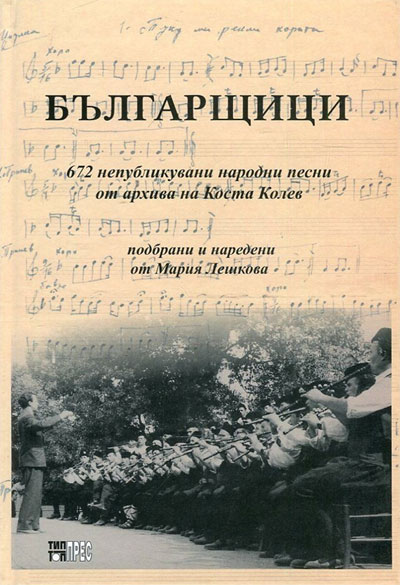The Balgarshtitsi compilation of 672 unpublished folklore songs from the archive of Kosta Kolev was released a few months ago. The famous accordion player, composer and conductor passed away in 2010 at the age of 89, leaving behind thousands of folklore sample arrangements, his own works in the folklore style, also soundtracks of dance plays etc. Kosta Kolev devoted decades of his active professional life to the Bulgarian National Radio where he was hired as a decoder and a head of a small orchestra in 1949. Later on he headed the then-existing Ensemble for Folklore Songs with Radio Sofia (the name of the BNR back then). A few years ago his wife Maria Leshkova decided to put his archive in order.
 ‘I came upon large databases that he had collected through all of his life, starting as of 1948. I knew about that passion of his, but it looked like we hadn’t thought about the wealth accumulated over the years. My husband had gathered those songs with the purpose of serving to him or the bunch of singers and instrumentalists that were working at the BNR ensemble. I noticed that he aimed each song at a certain singer yet during their writing down, as he was aware of the temper and style of everyone. A part of the songs comes from the live broadcast of the radio, they have only sounded on air and were never recorded. Those were performed by Boris Mashalov, Radka Kushleva, Masha Belmustakova, Rayna Botsova, Katya Taneva – those were all renown names back in time with almost no information on their work existing nowadays.’
‘I came upon large databases that he had collected through all of his life, starting as of 1948. I knew about that passion of his, but it looked like we hadn’t thought about the wealth accumulated over the years. My husband had gathered those songs with the purpose of serving to him or the bunch of singers and instrumentalists that were working at the BNR ensemble. I noticed that he aimed each song at a certain singer yet during their writing down, as he was aware of the temper and style of everyone. A part of the songs comes from the live broadcast of the radio, they have only sounded on air and were never recorded. Those were performed by Boris Mashalov, Radka Kushleva, Masha Belmustakova, Rayna Botsova, Katya Taneva – those were all renown names back in time with almost no information on their work existing nowadays.’
Being a conductor, Kosta Kolev was also committed to his work with different commissions, providing methodological assistance to various formations across the state and attended all folklore art forums. He was among the initiators of the first singing contest gathering in Bulgaria, held in the village of Gramatikovo in 1960. Some of the songs he wrote down back then found their place in the starting chapter of Balgarshtitsi. The man attended the great Koprivshtitsa congregation yet since its first edition, also the Pirin Sings event, he carried out expeditions for the search of folklore songs in the regions of Vidin, Pazardjik, Kotlen… ‘There was no place that he hadn’t visited,’ Mrs. Leshkova says. ‘He was on BNR business trips or he wrote down song lyrics provoked by casual informers.’
‘He had various interests,’ Maria goes on to say. ‘Folklore, yes, but any other kind of music too, alongside art, literature and different spheres of science. However, folklore was his primary devotion. He would always admire the Bulgarian cultural heritage.’
The selection and classification of the compilation’s songs took a few years, while the digitalization of the scores and the writing of the book lasted over one year. Each song comes with the date on which he wrote it down and on most occasions – the name of the singer. There is also this ‘translation’ of ancient and dialectic words. There are 11 chapters in the book – Patriotic Songs, songs from different expeditions and congregations, also songs from various folklore regions. The Kotel samples come in a separate chapter, as the maestro considered it ‘the nest of Thracian music’. There are some 700 pages in this huge volume. What is the purpose of this work? Will there be enough people out there to appraise it in this digital era?
Dances from the region of Varna (Kosta Kolev)
‘This question is a tough one. I didn’t ask it while working on the book as my only motivation was adoration. Yes, the value of these songs is huge – both as a style and as poetry. I think many intelligent people with different jobs and young singers will find the compilation useful. Bulgarians living abroad and heading different folklore formations have already shown interest towards this work. I would be happy to see these songs brought back to life.’The title word of the compilation is used by Prof. Ivan Shishmanov – a philologist, writer and politician from the early 20th c.
‘He would use it for something visibly small, but carrying huge content and showing the Bulgarians the way they were. I think this is the right title for this compilation of unique ancient melodies.’
English version: Zhivko Stanchev
Products made of wool inspire the feeling of inner comfort and warmth in the visitors of the Plovdiv Regional Ethnographic Museum. The exhibition "Bulgarian felts - a message from antiquity" presents an ancient craft, which is..
The Hague, a city in the south of the Netherlands, the administrative centre and the place where the Queen lives and works... Hardly anyone associates this city with Bulgarian folklore and traditions. But the fact is that the interest in..
On June 28 and 29th, the city of Razlog, in the region of Blagoevgrad, will present the magic of Bulgarian folklore. In these days, the XIII Festival of traditional horo dance will be held on the central square "Preobrazhenie". The..

+359 2 9336 661
